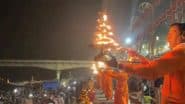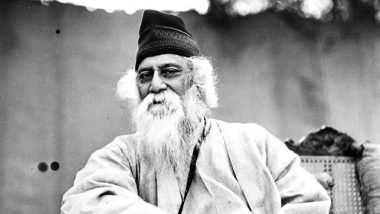New Delhi, August 7: Asia's first Nobel laureate Rabindranath Tagore, popularly known as Kabiguru or Gurudev is considered to be the architect of Bengali literature, music and art. Seventy-eight years after his death on August 7, 1941, Rabindranath is remembered even to this day today for his contributions. Apart from his literary offerings, Gurudev was the one who penned down the national anthem of India - "Jana Gana Mana" - which we sing with utmost pride and Bangladesh's "Amar Shonar Bangla."
Among the thousand poems and stories, Rabindranath Tagore - who was born as Robindronath Thakur - is remembered for his profoundly sensitive, fresh and beautiful verses of Gitanjali. It became so popular, that in 1913, he became the first non-European to win the Nobel Prize in Literature. Rabindra Jayanti 2019: Know Interesting Facts From Rabindranath Tagore's Life on His Birth Anniversary
Being a pioneer against the stereotypical belief that India was only a country of snake-charmers and superstitions, Tagore travelled to more than thirty countries on five continents and denounced jingoistic sentiments that were fuelling wars. His renowned essay "Nationalism in India" was scorned, praised and admired by Romain Rolland and other pacifists.
Apart from writing dramas like Dak Ghar, Chandalika and Raktakarabi, Tagore also penned down short stories like Bhikharini, Galpaguchchha, Sadhana, Kshudita Pashan, Kabuliwala and others, which inspired change in the thought processes of generations.
The great scholar even wrote eight novels and four novellas - Chaturanga, Shesher Kobita, Char Odhay, Noukadubi, Ghare Baire, Jogajog, Chokher Bali and Gora. Almost all have been adapted into films. Oscar-winning filmmaker Satyajit Ray's movies were inspired by his works too. Rabindranath Tagore and Translations: Why His Works Hold Indomitable Influence in Literature.
However, Tagore is most remembered for his poetries, which were inspired by his global travel and the atrocities he witnessed. Tagore's best-known collection of poetry Gitanjali was so appreciated that he was awarded the Nobel Prize in 1913, becoming second non-European after Theodore Roosevelt to receive a Nobel Prize. His other notable poems include Manasi, Sonar Tori and Balaka.
Besides being a prolific and highly-skilled writer, Tagore was an astonishing painter whose works were exhibited throughout Europe. Gifted with an artist's eye, he embellished his own handwriting in his manuscripts with simple artistic leitmotifs.
Considering his involvements in politics, Tagore opposed imperialism and supported Indian nationalists. He was of the view that even for those at the extremes of poverty, "there can be no question of blind revolution"; he recommended a "steady and purposeful education." Tagore also played a key role in resolving a Gandhi–Ambedkar dispute involving separate electorates for untouchables. Rabindranath Tagore Jayanti: Quotes by the Universal Voice and Cultural Icon on His 158th Birth Anniversary.
An advocate of self-help and education, Rabindranath lay down the foundation stone of Visva-Bharati University on 24 December 1918, where gurus gave pupils personal guidance of the emotional, intellectual, and spiritual nature. He conducted his classes under the tree, teaching his students about the importance of nature and free-thinking.
In remembrance to the great works of Kabiguru, eight Tagore museums - three in India and five in Bangladesh - were set up where his thoughts and great literature are kept safe. Even eight universities have been named after him - three in India and five in Bangladesh. Remembering Rabindranath Tagore on His Birth Anniversary Through His Quotes
Tagore was not only an Indian legend, but he was also a global persona who continue to live in our hearts, reminding us of the true values of being a human being.
(The above story first appeared on LatestLY on Aug 07, 2019 07:07 AM IST. For more news and updates on politics, world, sports, entertainment and lifestyle, log on to our website latestly.com).













 Quickly
Quickly




















